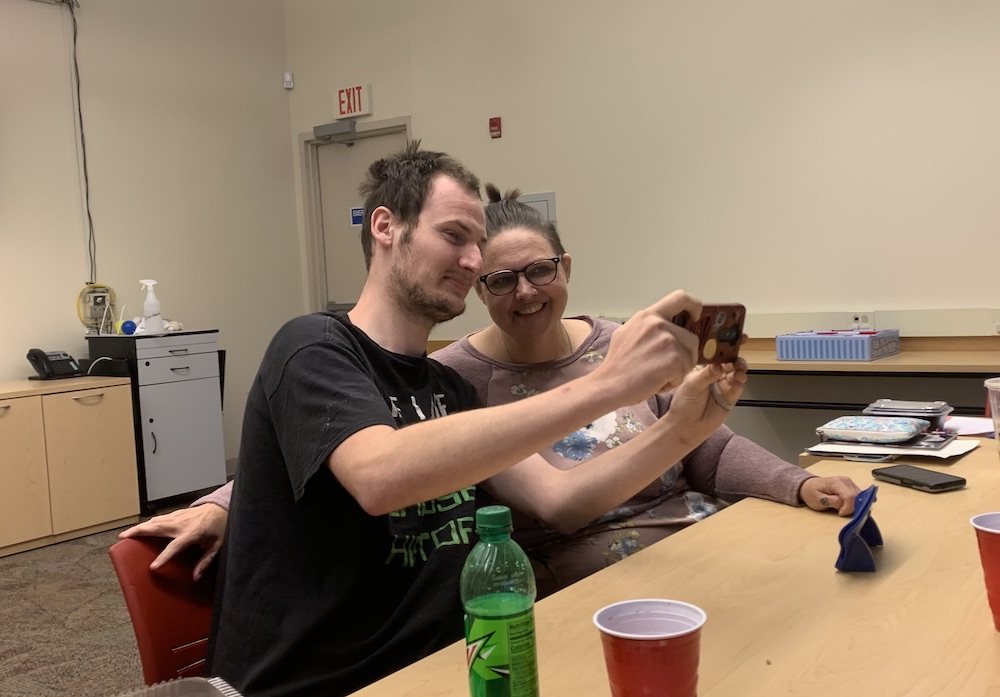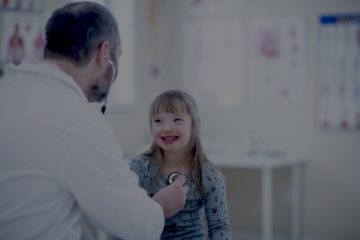By Erin Beck, Writing for the “When All Are Counted” Project
In West Virginia, there are more than 400 residents with intellectual and developmental disabilities waiting for a year or more for state assistance that would help them with the struggles that come with their challenges. That’s despite grassroots organizing and Capitol rallies just three years ago that led Governor Justice to declare he wouldn’t support any budget that didn’t include funding for full elimination of the waitlist, saying at the time, “When it comes to the health and well-being of some of our most vulnerable men, women, and children in West Virginia, I’m not interested in taking half-measures.” And the number of people who need help is increasing, but state officials haven’t matched that increase with additional funding.
West Virginia has a form of assistance called the IDD waiver. Meant to help keep people with IDD at home and in their communities instead of in institutions, like hospitals, people who prove they need the help qualify for assistance like therapy; transportation to medical appointments; in-home nursing care; and support from respite care workers, who provide in-home care for people with disabilities when parents or other caretakers need rest.
 Meanwhile, the state Department of Health and Human Resources is under federal investigation following allegations that it is holding patients eligible for the waiver program in institutions, including state-owned psychiatric hospitals when they should be living in homes in communities.
Meanwhile, the state Department of Health and Human Resources is under federal investigation following allegations that it is holding patients eligible for the waiver program in institutions, including state-owned psychiatric hospitals when they should be living in homes in communities.
Thanks to Jason’s approval for the waiver, he was able to get his own home in early adulthood with around-the-clock nursing. He received a waiver slot several years ago when state lawmakers cleared the waitlist, which had grown to more than 1,000 people at the time. Some had been waiting for about a decade.
Jason, who has moderate intellectual and developmental disabilities (IDD), attention-deficit/hyperactivity disorder (ADHD), depression and post-traumatic stress disorder (PTSD), had lived in a larger facility. Christy Peters, his guardian, knows there were good people there that tried to help him. But she said without the overwhelming environment of a larger facility, where staff are often focusing on higher-need patients, he now gets to know his in-home workers better.
For instance, they’ve learned that letting him listen to music on his headphones helps calm him down. And now she can visit whenever she likes. Jason also finally became ready to volunteer at the animal shelter.

Confined in a facility, he was a “runner” before, but that isn’t a problem anymore.
Sometimes, patients would run away for a sense of independence and control.
Now, she gets to tell him, “This is a place for your own.”
Choices give him that sense of autonomy. He can play a video game on his own terms. He doesn’t have to wait for group bike rides. He worked out a chore schedule with a roommate.
In 2019, under the direction of West Virginia Governor Jim Justice, West Virginia delegates and state senators allotted enough funding to clear the waiting list. More than 600 children received slots.
The extra funding was supposed to be built into the yearly budget, according to Jeremiah Samples, senior adviser to the Legislature’s Joint Committee on Government and Finance, who previously worked for DHHR.
But according to Jessica Holstein, DHHR spokeswoman, the list of people seeking services has grown from 4,634 in 2020 to 6,114.
And according to the Commissioner for the West Virginia Bureau for Medical Services Cynthia Beane, the state Legislature has not kept up with the increase. She said 416 remain waiting on the waitlist and 135 “left” the waitlist, clearing room for 135 new participants last month.
The budget appropriation for state fiscal year 2024 for the IDD waiver is $108,541,736.
“It was not increased from 2023, therefore, we do not anticipate adding more slots to reduce the (waitlist),” in SFY24 (State Fiscal Year 2024),” Beane said.
Holstein said “DHHR’s Bureau for Medical Services (BMS) is amending the IDDW application to further expedite enrollment of individuals on the waitlist who are in psychiatric facilities.”
Some advocates in years past have said some people have died while on the waitlist while others have moved.
Families described ways their lives would improve and their children could live fuller lives once they are participants in the waiver program.
Kelli Collins, a single mom, takes care of her 18-year-old son Elijah. He is nonverbal and has level 3 autism, which is characterized by severe deficits in social and emotional skills and great distress switching focus from activity to activity.
Kelli, of Huntington, said he is number 394 on the list. She said waiver services would be a huge financial help.
She expects to receive the help of respite care workers, transportation to his neurologist and family doctor appointments, Medicaid, and help two more days a week at a day program where he learns daily living skills.

She works as a secretary while he’s at the day program and as a medical transcriptionist from home during the other two days. She said she’s lucky to be able to work remotely.
“I don’t know what I would do, probably couldn’t afford to stay in my house,” she said. “I’d have to move in with my mom or a family member. And then of course, it’s been stressful trying to work it out with my job, letting them know what’s going on, and why I can’t be there full time.”
Even getting approved for the waiver waitlist can be a struggle.
To be approved for the waitlist, Kelli and her son had to see a psychologist, picked by state officials, who wasn’t familiar with his history.
He was diagnosed at two. She had to rehash ages 2 to 18.
“There’s so many questions you have to answer,” she said. “Can he eat with a fork? Can he ride a bicycle? Does he have any safety concerns? I mean, it’s just every little thing. And it’s stressful just going through that all the time when it’s been documented his whole life. It’s kind of like I had to prove he had autism, you know?”

Jimmie Bearne is the CEO of the Autism Services Center, a behavioral health center that provides waiver services to people in Cabell, Warne, Lincoln, Mason and Putnam counties. He said the workforce shortage should also be addressed, even if more people are given slots. Some healthcare workers moved to other jobs because of the pandemic, some chose early retirement, and some died.
“It is really, really hard to find staff,” he said. “Most behavioral health centers have a lot of job openings. So even with more waiver slots, it would be difficult to fully serve them.”
While receiving a waiver slot does help families, families described other problems with the program.
Jessica Wooten, a nurse practitioner, has a son named Jack who is nonverbal and has Down syndrome. Birth to Three workers told them about the waiver. She first applied for waiver services when he was three. That’s when people with IDD become eligible. But the state-selected psychologist turned them down.
“The person that evaluated him basically said, ‘He’s only three. So I can’t tell you if you will be disabled for life or not,’” she said.
Jessica is the board president of the state Down Syndrome Network. She noted that Down syndrome is a well-known diagnosis.
“It’s pretty well understood that you’re disabled for life,” she said. “Down Syndrome is a genetic disorder. None of that changes because you get older…You can get more services and you can learn and you can grow but you’re the fact that you have an extra chromosome will never change in your whole life.”
She reapplied in April. Her son is now 5. After the psychologist exam and a teacher questionnaire, he was approved for the waiting list (the list, not a slot for waiver services) in July.
Once they receive waiver services, she said her son’s life will improve because extra funding could offset the cost of a $6,000 iPad-like device that he can use to point at pictures to communicate since he speaks few words or pay for in-home workers or respite care. Much of her family’s income goes to his medical needs. Her son also goes to physical therapy, speech therapy, occupational therapy, and a Down syndrome clinic in Ohio. He has at least one appointment with co-pays a week.
“The cost of having a child with a disability is absolutely astronomical,” she said.
Jessica noted that some people leave the state for better services.
“Let’s take care of the people here,” she said.
She noted that some families don’t even know about the waiver. Her organization sends info packets to hospitals. But she said some people slip through the cracks. Not every hospital and healthcare worker calls. Some people call when they’ve learned through word of mouth.
According to a DHHR spokeswoman, “DHHR’s Bureau for Medical Services (BMS) recently promoted services by setting up informational tables at events such as the WV School Counselor’s Conference and the job fair for exceptional high school students. BMS also sent mailers to Medicaid members to inform them of all Home and Community Based Services available for those that qualify.”
Jessica said that DHHR could require new data be sent to state officials during newborn screenings.
“I would think that could easily have a checkbox on that screening,” Jessica said. “Does this baby have Down syndrome? Does this baby have cerebral palsy?”
A spokeswoman for DHHR said that by law, “birth defects are reported to the Office of Maternal, Child and Family Health. Trisomy 21 (Down syndrome) is a reportable diagnosis.”
But she added that there is a limitation.
“Developmental delays are often not able to be identified until children are at least several months old or until a parent or healthcare provider notes that milestones are not being met,” said Chloe Cook, DHHR spokeswoman.
In 2022, 15 cases were reported to DHHR, she said.
But according to Ashley Orndoff, part-time director of the Down Syndrome Network, they only receive six or seven referrals a year. According to the March of Dimes, in 2020, there were 17,323 live births in West Virginia. According to the federal CDC, one in 700 babies born has Down syndrome. That would equal about 25 babies born per year who have Down syndrome in the state.
“And the one common factor there is everybody goes to the doctor,” Ashley said.
She also said the waitlist time is about a year to a little more than a year now, “which isn’t where it used to be. But that’s not acceptable,” she said.
Ashley’s daughter was on the waitlist for about three years; she recently began receiving waiver services. She and her husband both previously worked outside the house, but now the waiver helps her provide care for her daughter at home. Ashley said the waiver also pays for music therapy and behavioral therapy for her daughter.
“It changed our lives in the fact that I was able to step back from what I was doing and focus on her care and her needs,” she said.
She said that a behavioral therapist is helping her and her husband change some parenting methods that they’d tried. The therapist focuses on positive reinforcement, meaning rewarding children for good behavior.
April Whittaker moved from Virginia to West Virginia in 2015. Her daughter Tammy, who is 16 and has cerebral palsy, has a tracheostomy tube and is quadriplegic, was on the waitlist for ages 14 and 15. She was approved in January of 2018 and got a slot in 2019.
In Monroe County, she had called DHHR to find out about services for her daughter when she moved there, but said she wasn’t informed about it.
Her daughter receives 24-hour nursing care.
She also said there were hurdles during the application process.
“So you get on the website,” she said. “You fill out the paperwork, you send the paperwork in, they send you a letter telling you that you need to get a psychological evaluation. Please pick from one of these people. Well, here’s the problem with that. There’s none in the Mercer, Monroe, Summers or Greenbrier County area.
“It’s literally from Kanawha County up,” she said. “The bottom half of the state is forgotten.”
Her son Dameon has high-functioning autism spectrum disorder. Health officials used to refer to that as Asperger’s syndrome but had changed the name of all autism diagnoses to autism spectrum disorder (ASD) to encompass a variety of functioning in 2013. But Dameon was denied because she was told he has Asperger’s, even though health professionals had begun using autism spectrum disorder.
April spent 15 years as a paralegal, and 18 years as a 911 dispatcher.
“Paperwork doesn’t scare me,” she said. “But at one point, I literally said, ‘This is more of a hassle than a help.'”
Karrie Jarrell, of Huntington, has a ten-year-old son, Kainen, with autism who has been on the waiting list for about a year. Along with Kainen, she cares for four other kids. He goes to school during the school year and to daycare over the summer. She works as a medical assistant.
Her kids don’t get to do many extracurricular activities.
“He’s a runner,” she said. “So I need somebody who’s going to be able to redirect him and take some stress off of the other kids because they don’t get to do as much because he has a very limited amount of places he can go and people who can take him there other than myself, because I take him to all of his appointments. Everything that he does, I am the one to do that.”
Kainen sees an occupational therapist, a speech therapist, and a behavioral therapist. Medicaid helps cover the costs. Once they get a slot, she hopes extra money will help her son with sensory delay and with respite help. She wants to get him into Applied Behavioral Analysis (ABA) therapy. She may be able to receive in-home assistance for him instead of sending him to daycare.
And like Jason, Kainen has a tendency to run away. She hopes ABA therapy will help him better handle his emotions and prevent that. ABA is a kind of skills-based therapy that uses positive reinforcement to help patients with communication and learning skills.
“I just want him to get the best help that he can for later on. Because mom won’t always be here,” she said.
This post has been updated to reflect that while DHHR doesn’t track IDD diagnoses statewide, it does collect Down syndrome data, although there are limitations. DHHR also said they do promote the IDD waiver program (although some families may be missed.)
Notes:
Christy Peters runs a club at the Elk Valley Library for Jason and people with similar disabilities, “a safe way to meet.”
She’d like to have more group members come. She said prospective members can email her at cpeters1370 @gmail.com.
More info on the IDD waiver program. Some services, including grants, are available to offset costs for people on the waiting list.

Erin Beck is a writer, journalist, and native West Virginian. She grew up in Doddridge and Ritchie counties, then earned a bachelor’s degree in journalism. Her work has appeared in the Charleston Gazette-Mail, Mountain State Spotlight, The Register-Herald, and several other West Virginia publications.



2 Comments
Cristy · August 12, 2023 at 7:28 pm
Erin gave a look into our live and those living or caring for individuals with disabilities. I appreciate and respect her efforts. Thank you.
Billie Oconnell · August 15, 2023 at 2:01 am
Great article!! As a nurse who works w/ all HCB programs, could you shed some light on the Aged & Disabled Waiver & Personal Care Programs? ESP the direct care worker shortage & how it affects the care of West Virginia’s Seniors & Disabled! Thanks again for bringing this topic to the forefront!!